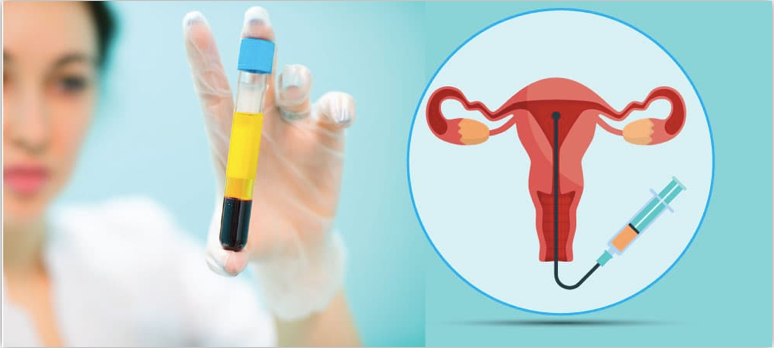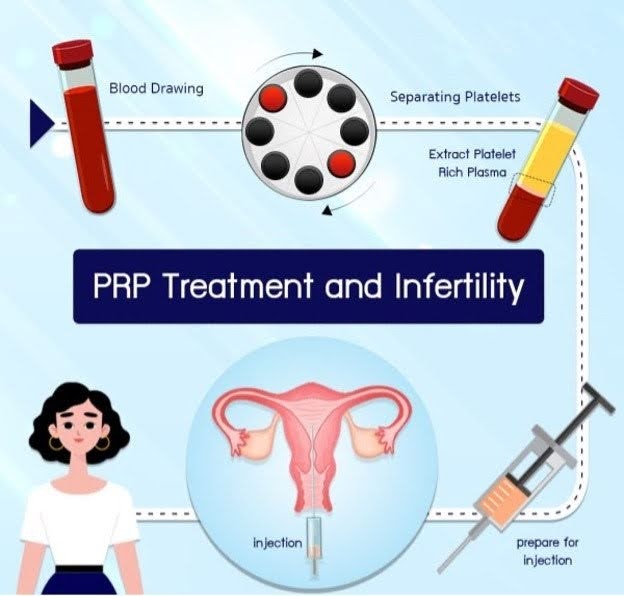Platelet-Rich Plasma (PRP) Therapy in Denver Exploring New Possibilities in Fertility Treatment
- A relatively new practice
- Still considered experimental
- Potentially boost the chances of a successful pregnancy
- Rejuvenate ovarian function
PRP & Fertility

Platelet-rich plasma (PRP) therapy is a promising approach to enhance fertility. Originally used in orthopedic and aesthetic medicine, PRP involves injecting a concentration of a patient’s own platelets, which are rich in growth factors and cytokines, into targeted areas of the body to promote healing and cellular regeneration.
In fertility treatments, such as Intrauterine insemination and In Vitro Fertilization, PRP is primarily used to improve ovarian function, thicken endometrial lining, and improve endometrial receptivity. This helps women with diminished ovarian reserve or poor endometrial lining potentially achieve a pregnancy.
While egg donation and surrogacy can address those problems, not all patients see them as acceptable or affordable.
PRP treatment is particularly beneficial to those who have undergone multiple IVF cycles and experienced recurrent implantation failure. PRP may also be useful for women who struggle to produce healthy eggs since PRP injections help stimulate your existing stem cells to produce better-quality eggs.
The procedure involves drawing a small amount of the patient’s blood, processing it to concentrate the platelets and growth factors, and then injecting the PRP into the ovaries or uterine lining, depending on the specific condition being treated. The growth factors in the PRP are believed to stimulate cellular repair, promote tissue regeneration, and improve blood flow, which can enhance the environment for embryo implantation or revitalize aging ovaries.
How It Works
The process for PRP fertility treatment involves several key steps, which are carefully coordinated to maximize the potential benefits for improving ovarian function or enhancing the uterine lining.
It is believed that the PRP can increase the chances of pregnancy by improving blood flow, spurring cellular repair, and stimulating tissue regeneration.
PRP as a fertility treatment is a relatively new practice that is still considered experimental.
PRP as a fertility treatment is a relatively new practice that is still considered experimental. There are currently no proven benefits, but it is believed that it could help hopeful parents overcome some common fertility issues.
Ovarian Rejuvenation PRP
As females age, the quality and quantity of their eggs decrease over time. Ovarian Rejuvenation is a treatment that has been shown to increase egg quality and quantity in women that suffer from a low ovarian reserve. The process works by injecting Platelet-Rich Plasma (PRP) directly into your ovaries to stimulate your existing stem cells to produce better-quality eggs.
Ovarian rejuvenation using PRP is typically recommended for IVF patients who have had one or more failed cycles, as well as for those who are dealing with more general infertility related to first or secondary pregnancy. It can help increase egg quality and quantity, leading to an improved chance of fertilization during subsequent cycles.

Ovarian PRP is best suited for you if:
- You tried to conceive for 6 to 12 months without success.
- You have had several miscarriages.
- You have been diagnosed with secondary infertility.
- You have had a failed IVF cycle due to egg or embryo quality.
One recent study involving 510 women with Poor Ovarian Response (POR) and average age of 40.3 has found that PRP treatments resulted in a pregnancy rate of 20.5% and sustained implantation/live birth rate of 12.9%. Among these women, 312 (65.8%) who attempted IVF after PRP treatment generated embryos and underwent embryo transfer, 83 (17.5%) achieved a pregnancy, and 54 (11.4%) achieved sustained implantation/live birth.
Uterine PRP
A person who has secondary infertility or recurring miscarriages may suffer from a thin endometrial lining, which impacts embryo implantation. Uterine PRP infusion is a treatment that has been shown to increase implantation rates and endometrial lining thickness.
The process works by injecting Platelet-Rich Plasma (PRP) directly into your uterine cavity to stimulate your existing stem cells to produce a potentially thicker endometrial lining. A thicker endometrial lining will better support implantation and will create a more habitable environment for the embryo.
Uterine PRP is best suited for you if:
- You suffer from a thin endometrial lining.
- You have had several miscarriages.
- You have recurrent implantation failures.

Following the PRP procedure, patients may proceed with other fertility treatments such as in-vitro fertilization (IVF) or intrauterine insemination (IUI), depending on the treatment plan developed with their fertility specialist.
The effectiveness of PRP treatment may vary, and its impact on fertility outcomes can take weeks to months to fully manifest. Frequent follow-ups with your fertility specialist are crucial to track progress and adjust the treatment plan as needed.
The use of PRP in the treatment of infertility is still a fairly new practice and considered experimental with no proven benefit yet; however, it could address some of the most common barriers to successful pregnancy and is one of the most promising advances in fertility treatment in recent years.

Resources
1.Elias M, et al. Platelet-rich plasma (PRP) treatment of the ovaries significantly improves fertility parameters and reproductive outcomes in diminished ovarian reserve patients: a systematic review and meta-analysis. Journal of Ovarian Research. 2024. Volume 17, Article number: 104
2.Pacu I, et al. Use of platelet-rich plasma in the treatment of infertility in poor responders in assisted human reproduction procedures. Exp Ther Med. 2021 Oct 7;22(6):1412.
3.Agirrnegiokoa J, et al. Potential of Plasma Rich in Growth Factors (PRGF-Endoret) to Enhance the Efficacy of Assisted Reproductive Techniques in Refractory Cases. Cureus 2022, 14(7): 1-9.
Have Questions?
Schedule a Consultation With Us Today
Are you struggling to grow your family? As parents ourselves, we certainly understand the desire to conceive and experience the joys of parenthood, and know that you are probably interested in any possible solution that could realize your goals.
Our Denver and Englewood offices want to help you make informed choices on your journey toward parenthood, and we are here to provide you with the expert guidance you deserve.
If you would like to discuss your goals and your challenges with fertility specialists who have helped hopeful parents from around the world grow their families, we invite you to reach out to us today. You can send us a message online or call us:








